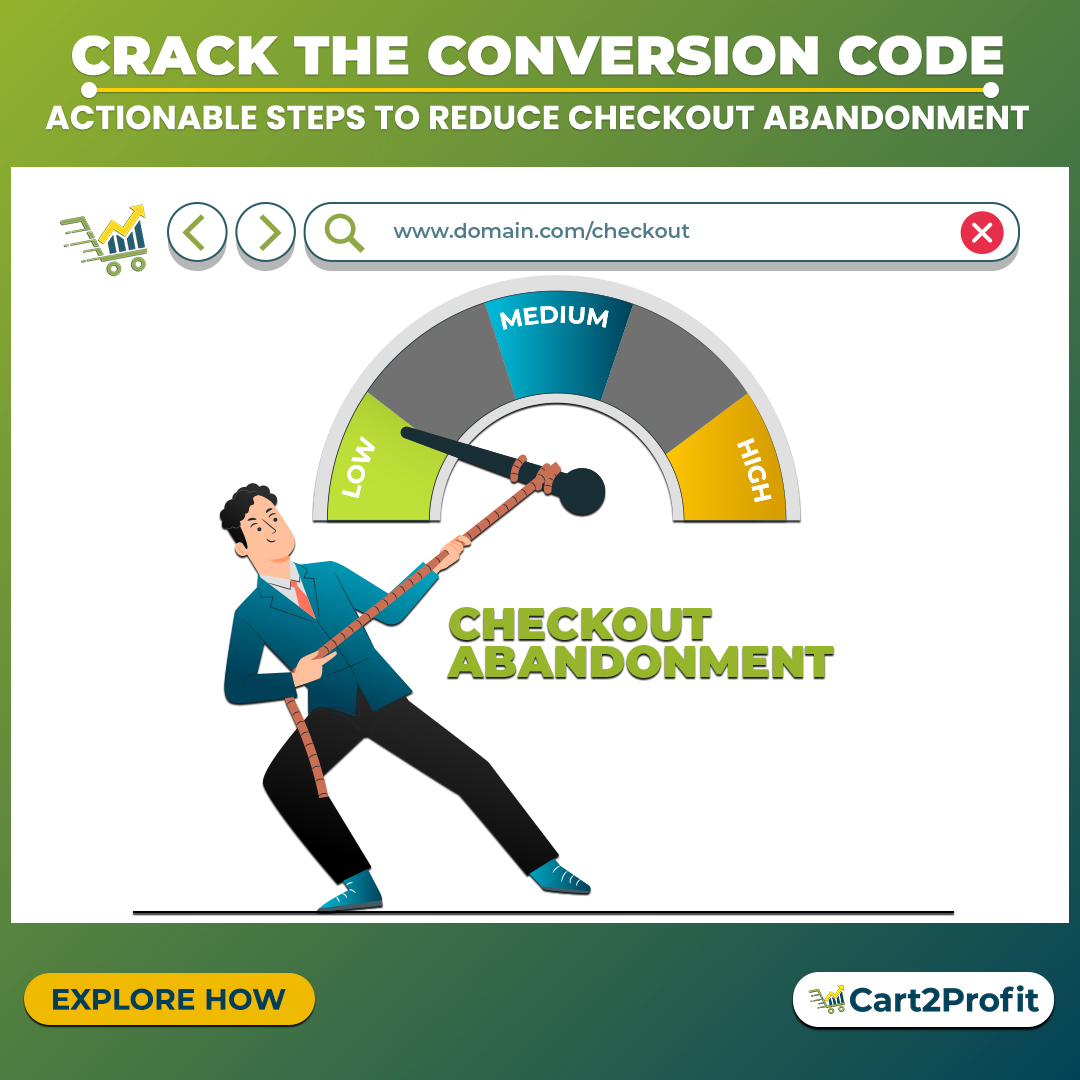
Reducing checkout abandonment is an important objective for e-commerce businesses aiming to maximize their conversion rates and increase sales. By addressing the common pinpoints and hurdles that lead customers to abandon their purchases, businesses can optimize their checkout process and form a seamless and frictionless experience.
Table of Content
One of the main reasons for checkout abandonment is a complex and lengthy checkout process. Streamlining the process by minimizing the number of steps and form fields can significantly improve the user experience. Remove any unimportant information or requirements that could stop customers from completing their purchase.
Requiring customers to create an account before making a purchase can be irritating for some shoppers. Providing a guest checkout option allows customers to move forward with their purchase without the added step of creating an account. This eases the process and reduces friction, increasing the likelihood of completing the checkout.
Unforeseen costs and fees are a common cause of checkout abandonment. Visibly display all costs, including shipping fees, taxes, and any additional charges upfront. Avoid surprises during the checkout process, as this can lead to customer frustration and abandonment. Providing transparency builds trust and motivates customers to move forward with their purchase.
Mobile shopping is on the rise, and a significant portion of online purchases are made through mobile devices. Ensure that your checkout process is mobile-friendly and improvised for smaller screens. A seamless and user-friendly mobile experience reduces friction and enhances the chances of completing the purchase.
A slow-loading website or checkout page can irritate customers and drive them away. Improve your website’s performance to ensure fast loading times, smooth navigation, and a responsive design. By providing a seamless and efficient user experience, you can diminish abandonment rates and increase conversion rates.
Security concerns can lead customers to abandon their purchases. Display trust signals, security badges, and SSL certifications prominently during the checkout process to assure customers that their personal and financial information is safe. Incorporating well-known and reliable payment gateways can also give confidence and remove hesitation.
Shoppers have multiple payment preferences, and limited payment options can result in abandonment. Offer a variety of payment methods, including credit cards, digital wallets, and alternative payment solutions, to cater different consumer preferences. The more options you list, the more likely customers will find a suitable method for themselves, reducing checkout abandonment.
Even if customers leave their carts, there’s still a chance to bring them back. Employ remarketing strategies such as email reminders or personalized offers to remind customers about their abandoned carts and motivate them to complete the purchase. Providing incentives or limited-time discounts can help re-engage customers and help them to finalize their transaction.
Reducing checkout abandonment requires under way testing and optimization. Conduct A/B tests to compare different versions of the checkout process and calculate their impact on abandonment rates. Monitor analytics and gather customer feedback to identify pain points and areas for improvement. Continuously repeat and improve based on data-driven insights.
Live chat supports supplying customers with real-time assistance during the checkout process. By providing a chat option, you can address any concerns, clarify doubts, and provide instant assistance when customers need it most. Prompt and personalized support can help overcome problems and reduce abandonment rates.
Support team receive NDRs from courier partners and prioritize them based on the severity of the issue. For instance, NDRs due to incorrect addresses may require immediate attention to prevent delays, while those due to recipient unavailability can be scheduled for later contact.
Support team agents reach out to customers to understand the reasons for non-delivery and resolve any underlying issues. This may involve verifying addresses, updating contact information, or addressing concerns regarding the shipment.
Once the issue is resolved, Support team agents coordinate with courier partners to schedule a redelivery attempt. This ensures that customers are informed about the new delivery schedule and can make necessary arrangements to receive the shipment.
Support team generate reports on NDR trends and identify recurring issues. This data can be used by businesses to improve their shipping processes, reduce NDR rates, and enhance customer satisfaction.
Support team play a vital role in identifying and addressing fake NDRs, where delivery partners may falsely mark shipments as undelivered. By investigating discrepancies and verifying delivery attempts, call centers help ensure that genuine NDRs are prioritized and addressed promptly.
Support team gather valuable feedback from customers regarding NDRs and overall delivery experiences. This feedback helps businesses understand customer pain points and identify areas for improvement in their shipping and logistics operations.

 Inbound Call CenterMay 25, 2024Role of Inbound Call Centers in Customer Satisfaction
Inbound Call CenterMay 25, 2024Role of Inbound Call Centers in Customer Satisfaction Cart Abandonment SolutionAugust 22, 2023D2C Cart Abandonment Solutions for Automotive Industry
Cart Abandonment SolutionAugust 22, 2023D2C Cart Abandonment Solutions for Automotive Industry Cart Abandonment SolutionAugust 22, 2023D2C Cart Abandonment Solutions for Personal Care and Hygiene
Cart Abandonment SolutionAugust 22, 2023D2C Cart Abandonment Solutions for Personal Care and Hygiene Cart Abandonment SolutionAugust 21, 2023D2C Cart Abandonment Solutions for Health and Wellness
Cart Abandonment SolutionAugust 21, 2023D2C Cart Abandonment Solutions for Health and WellnessAuthor Profile Varuna Raghav As a CX and marketing specialist, Varuna Raghav has more than 15+ years of experience to […]
Read more
is the apt framework developed for deploying the right mix of People, Process & Technology in a business with a clear eye on increasing lead conversion, reducing customer acquisition & management cost, and winning customers for life.